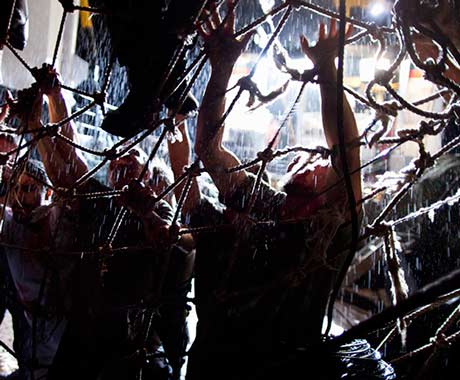Back in 2007, the original [REC] was among the found footage movies to grant the listless genre a stay of execution with its uncannily effective blend of simmering dread and in-your-face jump scares. Two years later, the sequel expanded on the simple concept of a newscaster capturing the outbreak of a rage virus in an apartment building to amp up the action and intrigue with a S.W.A.T. team and the supernatural. While it didn't proffer the same terror as its predecessor, [REC] 2 was a worthy follow-up.
For the successful Spanish horror series' third instalment, co-directors Jaume Balaguero and Manu Diez parted ways, with Diez ditching the conceit of the previous films in favour of traditional cinematography and campy, flaccid horror comedy, while Balaguero helmed the exceptional psychological thriller, Sleep Tight. That's why the prospect of Balaguero back in the saddle to wrap up the series is so exciting, and why the film's ultimate mediocrity is so disappointing.
Retaining the style of the superfluous [REC] 3 and jettisoning the rest, save a rote nod in the form of a single survivor/eventual body count contributor, Jaume picks up where the second film left off: with initial carnage reporter Angela (Manuela Velasco) being rescued from the apartment building and taken to an oil tanker to be quarantined and examined along with anyone else to have had contact with the infected. This conveniently brings Angela together with the burly S.W.A.T. guys from round two for what, early on, looks set to be a greatest hits collection of the franchise's strengths.
All too soon though, it becomes apparent just how difficult it is to generate chills, not to mention interest, when there's so little left of the story's central mystery and the characters, despite modest attempts, are primarily thin ciphers set up to support the film's heavy-handed bleating about the importance of sacrifice (a theme as permeable as horror tropes deem necessary). A saccharine score only serves to further undercut any lingering sense of tension not already hobbled by the sometimes-desultory direction.
To be sure, the practical gore effects will please splatter junkies that don't demand much beyond an orgy of messy kills from their cinema. Unfortunately, for those of us drawn to the early films' take on the unwilling cannibal fantasy — by virtue of the sheer fright potency of the first and the unexpected combination of theology and science of the second — will be left as cold as the emotional vacuum keeping Apocalypse from finding life after first-person footage.
(eOne)For the successful Spanish horror series' third instalment, co-directors Jaume Balaguero and Manu Diez parted ways, with Diez ditching the conceit of the previous films in favour of traditional cinematography and campy, flaccid horror comedy, while Balaguero helmed the exceptional psychological thriller, Sleep Tight. That's why the prospect of Balaguero back in the saddle to wrap up the series is so exciting, and why the film's ultimate mediocrity is so disappointing.
Retaining the style of the superfluous [REC] 3 and jettisoning the rest, save a rote nod in the form of a single survivor/eventual body count contributor, Jaume picks up where the second film left off: with initial carnage reporter Angela (Manuela Velasco) being rescued from the apartment building and taken to an oil tanker to be quarantined and examined along with anyone else to have had contact with the infected. This conveniently brings Angela together with the burly S.W.A.T. guys from round two for what, early on, looks set to be a greatest hits collection of the franchise's strengths.
All too soon though, it becomes apparent just how difficult it is to generate chills, not to mention interest, when there's so little left of the story's central mystery and the characters, despite modest attempts, are primarily thin ciphers set up to support the film's heavy-handed bleating about the importance of sacrifice (a theme as permeable as horror tropes deem necessary). A saccharine score only serves to further undercut any lingering sense of tension not already hobbled by the sometimes-desultory direction.
To be sure, the practical gore effects will please splatter junkies that don't demand much beyond an orgy of messy kills from their cinema. Unfortunately, for those of us drawn to the early films' take on the unwilling cannibal fantasy — by virtue of the sheer fright potency of the first and the unexpected combination of theology and science of the second — will be left as cold as the emotional vacuum keeping Apocalypse from finding life after first-person footage.
